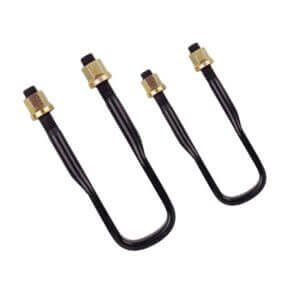One、Introduction of U-shaped Bolts For Automotive Chassis
With the rapid development of the automotive industry, the safety and stability of chassis systems are increasingly valued.
As an important connecting component in the chassis system, the material of U-bolts directly affects the performance of the entire system.
This article will provide a detailed introduction to the materials and performance characteristics of U-bolts for automotive chassis.

Two、 The role of U-bolts in automotive chassis
The U-bolts on the car chassis are mainly used to connect various components of the car chassis, such as suspension systems, braking systems, steering systems, etc.,
playing a role in fixing, supporting, and transmitting loads.
Three、Material classification of U-bolts
1. Ordinary steel
Ordinary steel is a type of carbon structural steel with good malleability, machinability, and excellent welding performance.
Due to its low cost, ordinary steel U-bolts are widely used in the automotive industry.
2. High strength steel
High strength steel refers to an alloy steel with higher strength than ordinary steel, which has high tensile strength and fatigue resistance.
High strength steel U-bolts are mainly used for chassis components that can withstand large loads, such as heavy-duty trucks and buses.
3. Stainless steel
Stainless steel is an alloy steel with high corrosion resistance, mainly used to prevent rust and corrosion.
Stainless steel U-bolts are often used in areas with severe corrosion environments, such as coastal areas and chemical enterprises.
4. Aluminum alloy
Aluminum alloy U-bolts have lightweight, high strength, and good corrosion resistance,
mainly used in vehicle models that reduce vehicle weight and improve fuel economy.
However, the poor welding performance of aluminum alloys limits their application in the automotive industry.

Four、 Performance characteristics of U-shaped bolts made of different materials
1. Ordinary steel
Ordinary steel U-bolts have the advantages of low cost, good processing performance, and wide applicability, but their tensile strength and fatigue resistance are relatively low.
2. High strength steel
High strength steel U-bolts have high tensile strength and fatigue resistance, making them suitable for chassis components that can withstand large loads.
However, their cost is high and their processing performance is poor old
3. Stainless steel
Stainless steel U-bolts have good corrosion resistance and are suitable for areas with severe corrosion environments
but their cost is high and their welding performance is poor.
4. Aluminum alloy
Aluminum alloy U-bolts are lightweight, high-strength, and have good corrosion resistance.
They are mainly used in vehicle models that reduce vehicle weight and improve fuel economy, but their cost is lower and their performance is higher,
Five、 Selection and application of U-bolt material for automotive chassis
When selecting the material of U-bolts for automotive chassis, it is necessary to comprehensively consider factors such as cost,
performance, processing performance, and corrosion resistance. For general vehicle models, ordinary steel U-bolts are sufficient to meet performance requirements;
For high-performance and lightweight vehicle models, U-bolts made of high-strength steel, stainless steel, or aluminum alloy materials can be considered for use
Six、 Summary U-shaped Bolts For Automotive Chassis
The material of U-bolts in automotive chassis has a significant impact on the performance of the entire chassis system.
When selecting the material of U-bolts, it is necessary to comprehensively consider the specific usage environment and performance requirements of the car.

